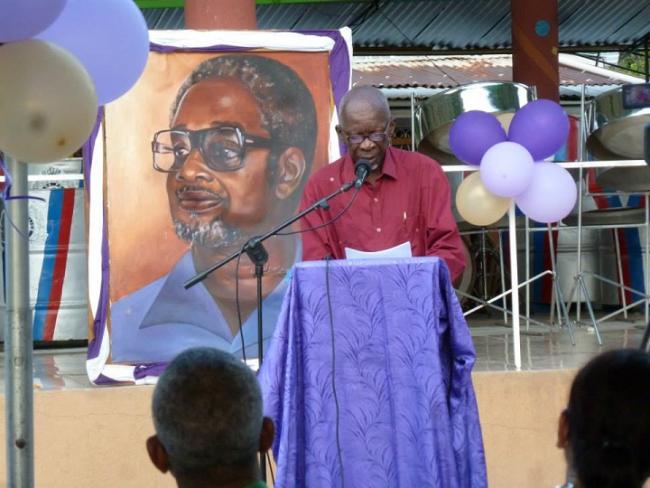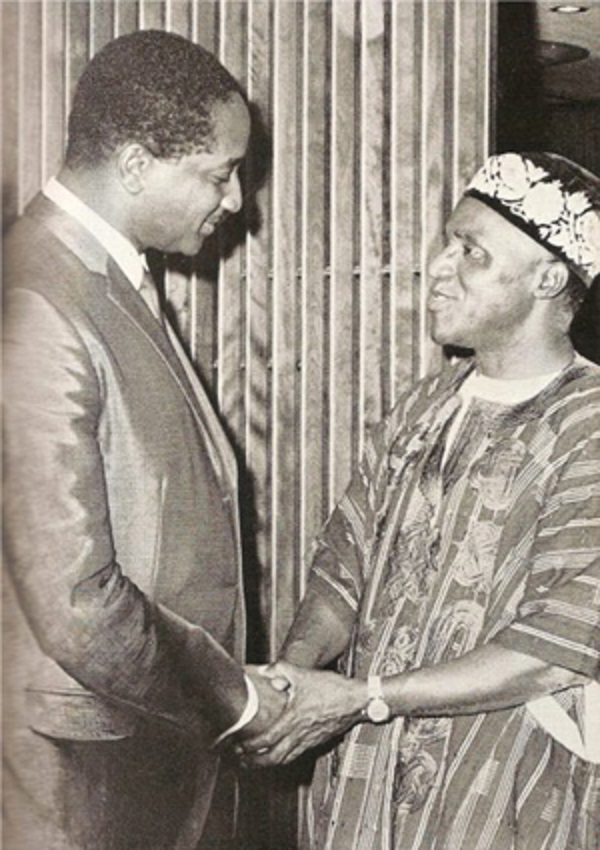10th May, 2013
His Excellency Jocob Zuma
President
Republic of South Africa
As a Guyanese national who has been involved at the Cabinet level in the adoption of the country’s Foreign Policy decisions, and as someone with a long-standing and profound admiration for Nelson Mandela and for the South Africa that he has bequeathed, I feel an abundant concern at the decision to defer the grant of the posthumous offer of the Oliver Tambo Award to the late Forbes Burnham. At the root of this emotion lie not only my knowledge of how intimately close the people of South Africa were to the heart of the late Forbes Burnham, but also the high esteem which I have personally felt for this country and its leadership since 1994 when majority rule came to South Africa.
In the brief span of two decades your country has managed to acquire an undisputed moral force on the African continent. Its democratic evolution has vested it with a certain authority in southern Africa and made it a model and a beacon for the rest of the continent.
On the international stage, this regional standing has helped to bestow on South Africa the image of a stable, progressive and influential state, and made it a major actor. At the present time the General Assembly is giving consideration to reforming the Security Council in order to make it more democratic and more representative of present-day political and economic realities, as opposed to those which prevailed at the end of the Second World War In this context, South Africa enjoys the support of a large number of member states as a country which richly deserves to have permanent membership of the Council, side by side with China, France, Russia, United Kingdom and United States. There is presently no indication as to when such a change would take place but the fact that less than two decades after the establishment of majority rule, South Africa has this kind of image speaks eloquently to the country’s undisputed international respectability.
My sincere hope is that if and when this elevation does finally take place, it would not be under a President given to flip-flopping, in the way demonstrated recently by your good self in the matter of the award of the Oliver Tambo Prize. At the level of major player, such as being a permanent member of the United Nations Security Council, the international community expects demonstrations of sure¬footedness decisions arrived at after the most careful and detailed reflection. We must know where leaders stand on issues. This is a bar that Mitt Romney, for example, could not cross in the last American elections, that of consistency. One can understand a change in position when the evidence on the basis of which an earlier decision was taken was found to be faulty. But there is no tolerance for backward somersaults hastily made on the basis of self-serving representations advanced in a domestic political context, and one which bears no relationship to the principal issue at hand. What these representations reveal is that pseudo-intellectualism is alive and kicking in the Caribbean, with the pseudo-intellectuals doing what they know so well to do, dragging red-herrings and sowing confusion.
To my mind, the issue seems to be clear and straightforward; The Oliver Tambo Award is about the internal politics of South Africa at a particular point in its history, and South Africa alone. It is given to foreign citizens who have promoted South Africa’s interests and aspirations in that era through cooperative solidarity and support. The question therefore is: did the late Forbes Burnham promote South Africa’s interests and aspirations through such cooperative solidarity and support, or did he not? I have not seen this question addressed by any of the writers who have expressed opposition to the idea of granting the Prize to the late Forbes Burnham.
Since writers before myself have abundantly chronicled the details of the actions of the Guyana Government which have been inspired by Forbes Burnham’s philosophy where relations with Africa were concerned, our political and material support for the liberation of Southern Africa, repeating them here will serve little purpose. At any rate, I recognize that the actions of the late Forbes Burnham in relation to Southern Africa may not be in the forefront of Your Excellency’s historical memory or that of any of your advisers. Even if this were so, it is inexcusable. Great leaders never forget those who helped their countries, in whatever ways, when they were struggling to free themselves from oppression; especially those who helped them at great sacrifice. They remember; and they honour that memory.
Moreover, much of that record relates to the actions of the Guyanese leader toward Southern Africa as a region. South Africa is, of course, a part of that region, and so represented the head of the animal that had to be slain, and Guyana’s actions vis a vis the lower parts of that body played a most significant part in destroying the inner workings of that evil and criminal head. But I wish to focus on some of the most significant actions which Guyana, under the inspired leadership of the late Forbes Burnham, took on behalf of the people of South Africa itself.
President Zuma, you have had a distinguished and honourable career in the struggle against apartheid. I recall that you were imprisoned on Robben Island along with Nelson Mandela on charges of conspiring to overthrow the apartheid regime. However fuzzy may be Your Excellency’s memory of the contributions of fellow-strugglers in the distant Caribbean to the struggles taking place in the wider region, you will certainly recall vividly the inhumanity of the conditions in Soweto, not a great distance from your native Kwa-Zulu birthplace. Here, on June 16th, 1976, a day that will live in infamy, the Police of Soweto opened live fire against a number of youths peacefully protesting against the introduction into their schools of instruction in Afrikaans, the language of the oppressors. The victims are estimated to have exceeded 600. You, Excellency, were in Mozambique at that time and were able to see first-hand, but without being a stranger to them, the effects of the savagery visited upon your countrymen and women as manifested in the condition and the stories of the exiles in the wake of that massacre.
Your Excellency will certainly remember, no less, that on June 19th 1976 the United Nations Security Council pronounced itself against the Soweto massacre in the following terms:
“–strongly condemns the South African Government for its resort to massive violence against, and killings of, the African people including school children and students opposing racial discrimination.”
The Council at that time was presided over by the Ambassador appointed to the United Nations Mission by the late Forbes Burnham, Rashleigh Jackson. While Sowetans were being slaughtered like cattle, Rashleigh Jackson, at the highest levels of the United Nations, was ensuring that the rest of the world took notice and condemned the butchery. The adoption of that resolution was no walk-in-the-park for the Council President. After all, South Africa had three staunch allies on the Council -France, United Kingdom and United States -who could be relied upon to veto any resolution condemning it, as they had done before and would do subsequently. That array of forces was formidable enough for Ambassador Jackson to have resigned himself to what appeared inevitable, and done nothing. But inspired by the philosophy of the late Forbes Burnham, he saw human freedom as indivisible. This meant that so long as freedom was denied to our brothers and sisters in Soweto and the rest of South Africa, it was denied to us in the Caribbean also. He persevered, using all of his diplomatic skills, the adoption without a veto, of the resolution condemning South Africa for the Soweto massacre. That action, and the rest, as they say, is history.
Also worthy of recall in this general context are Forbes Burnham’s principled actions against South Africa in the area of sports. You have not forgotten, Excellency, that Prime Minister Vorster had stated quite categorically, as long ago as 1967, that there would be no mixed-race sports in South Africa, regardless of the proficiency of the participants. This included cricket, in respect of which South Africa, like which the Caribbean shared a common interest. Forbes Burnham determined that at whatever price, he would exploit this commonality on behalf of the victims of apartheid. Accordingly, in 1976, the same year of the Soweto massacre, a scheduled match between Guyana and another territory in the region was cancelled because of Forbes Burnham’s refusal to allow entry into the country, a batsman from the opposing team which had played against South Africa as part of an international team the previous year. The Guyanese leader was resolute that so long as the dignity of his brothers and sisters continued to be desecrated in South Africa, the isolation of the apartheid regime was an essential international duty and service, in respect of which there would not be compromise where he was concerned. This policy had the effect at times of irritating relations within the region, but Forbes Burnham remained adamant. Five years later, a Test match with an English team scheduled for Guyana was also cancelled because one of its members was refused entry into the country on the ground that he had played and coached in South Africa. Eventually, the outworking of this policy of isolating those who gave comfort to the apartheid practitioners became a significant point of additional pressure on the apartheid regime, which is now part of history’s dustbin.
Mr. President, a famous countryman of yours, Steve Biko, himself one of apartheid’s most prominent victims, wrote on 1 December 1976 to Dick Clarke of the United States, “We rely not only on our own strength, but also on the belief that the rest of the world views the oppression and blatant exploitation of the black majority by a minority as an unforgivable sin that cannot be pardoned by civilized societies.” For the late Forbes Burnham, there was to be no pardon for apartheid. He could not give the kind of practical support that the people of Soweto and the rest of South Africa most needed against their oppressors. But he gave what support he could readily and abundantly give political, diplomatic and in the area of sport. According to my understanding of the spirit that underlies the offer of the Oliver Tambo Award, it is that kind of courage, commitment and steadfastness, sacrificial at times, that the Award seeks to identify and honour. It is insulting to the memory of the victims of apartheid, including that of Oliver Tambo himself, that the lofty motivation of the Award should be so massively high-jacked and distorted to serve the interests of a few pseudo-intellectuals, and their hand-maidens inside and outside of the Cooperative Republic of Guyana.
With highest regards.
Yours sincerely,
Jeffrey R Thomas
Former Snr. Minister
Government of Guyana






